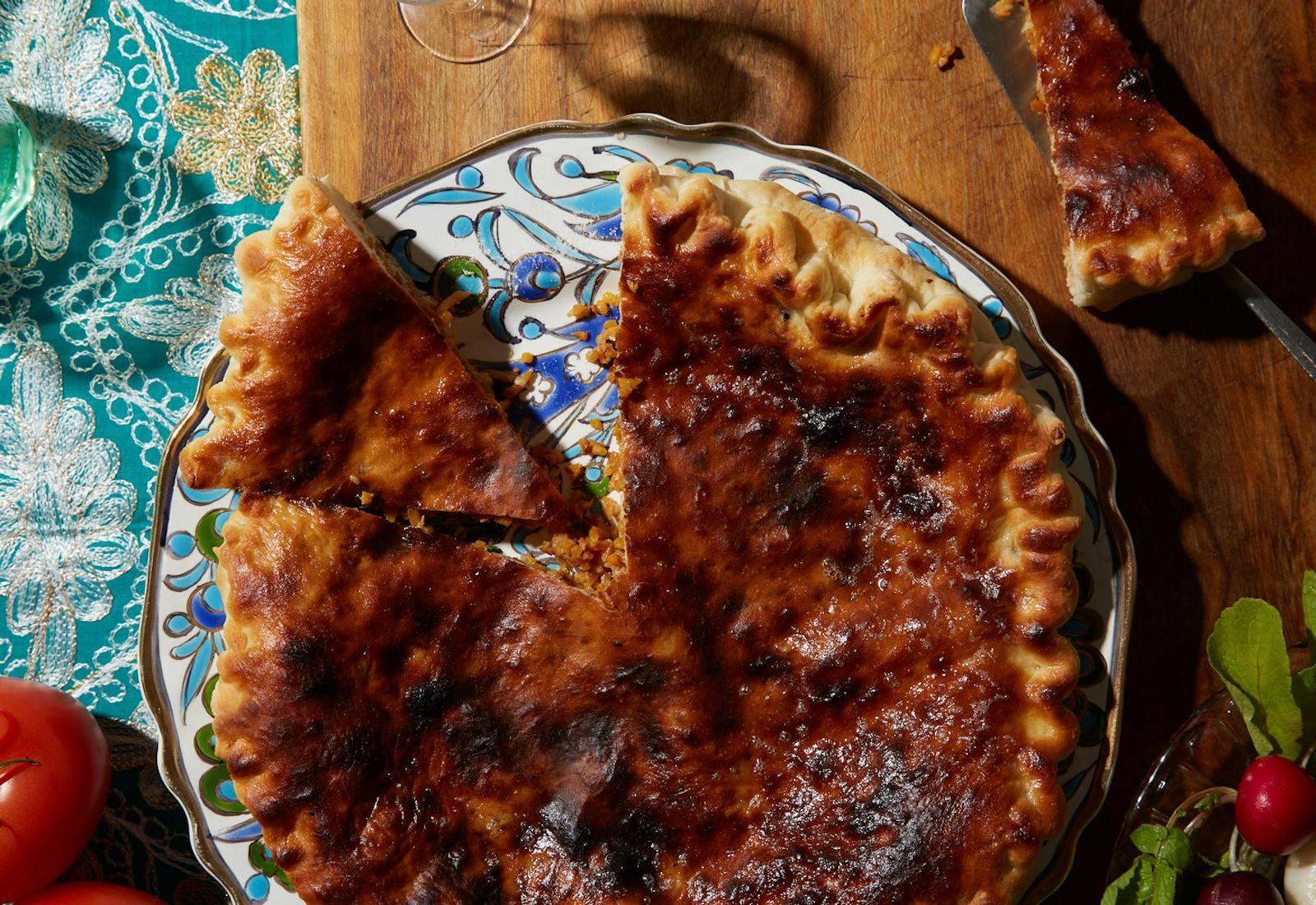Shared by Alona Eisenberg

This recipe was shared by Alona Eisenberg. Read more about her family in "Finding a Route to the Kavkaz Mountains in the Kitchen" and try her recipes for pasta with walnut sauce and beef filled dumplings.
The pumpkin and walnut filling is unique, and can be made dairy-free, parve and vegan when omitting the butter.
Other fillings include:
Ground beef or lamb with various chopped green herbs (This version is done with no top dough round, just the bottom dough round and the meat mixture on top, like pizza or lahmajun): 1 ¾ pounds ground beef or lamb, ¼ bunch chopped cilantro, 1 grated plum tomato, kosher salt and pepper, to taste. Mix the filling ingredients and divide between each thinly rolled dough half, leaving a wide 2- to 2 ½-inch rim. Fold the edges up over the filling as you would a galette, to keep the juices in.
Mixed greens: 1 package fresh spinach, 1 bunch celery leaves, ¼ bunch each of parsley, cilantro, dill and mint. Chop the greens and herbs, mix, and season with kosher salt and freshly ground black pepper for a parve version, or with ⅔ pound Tvoro cheese or Bulgarian feta for the dairy version. Roll and fill the dough as directed.
Make the dough: Combine all the ingredients in a mixer bowl equipped with the hook attachment. Mix until the dough comes together and pulls away from the sides of the bowl, 4 to 5 minutes. Cover the bowl with plastic wrap or a damp towel and place in a warm place until the dough has doubled in size, 1½ to 2 hours.
Meanwhile, make the filling: Melt the butter and oil in a large skillet over medium-high heat. Add the cumin seeds and toast until fragrant, about 1 minute. Add the grated pumpkin, spread evenly in the pan and sauté, stirring occasionally, until the liquid evaporates, 5 to 7 minutes. Add the ground walnuts, salt and pepper to taste, and mix well. Transfer to a bowl, loosely cover and refrigerate until cool, about 1 hour.
To make the flatbreads: Preheat the oven to its maximum temperature, 500°F to 520°F, with a pizza stone or upside-down sheet pan placed on a rack in the lower third of the oven to heat. Move the risen dough to a large, lightly floured work surface. Knead just to form into a ball,1 to 2 times. Divide the dough in half with a dough cutter. Keep one half covered while working with the other half.
Divide one half of the dough into one-third and two-thirds segments. Pat the two-thirds piece of dough into a round and roll out as thinly as possible without tearing, dusting generously with more flour as needed. The dough should be especially thin at the edges, to avoid a thick seam where the two pieces of dough are joined around the filling. Carefully move the larger dough round onto a large sheet of parchment paper and set aside. Form the smaller third into a round on the floured surface and roll out as thinly as possible.
Spread half of the pumpkin filling evenly over the larger circle, leaving a wide rim (about 1 to 1½ inches) around the edge. Place the smaller dough round on top of the filling (it will not cover it completely) and flatten gently with your fingers to push out air bubbles.
Begin crimping the two edges of the dough rounds together in a classic Kavkazi braid pattern by bringing the inner round towards the outer with your index finger and the outer round towards the inner with your thumb, and lightly pinching them together. With your other hand, continue to pull the outer circle of dough inwards and turn the parchment as you advance, creating a tightly sealed seam around the filling.
Carefully slide the parchment with the filled flatbread onto the baking stone or sheet in the oven. Bake until puffed and golden brown, 8 to 10 minutes. Remove and immediately brush with the melted butter or oil. Let cool slightly before cutting into wedges.
Meanwhile, repeat steps 4 through 7 with the remaining half of the dough and filling.
Alternative folding technique: Starting from step 3, roll out each half of the dough into a large, thin round. Divide the filling between the rounds, leaving a wide 2- to 3-inch rim on each. Pull the edges of the dough towards the center of each round over the filling and pinch firmly to seal. Flip the filled flatbreads over seam-side down onto pieces of parchment paper and bake as instructed.
Make ahead: The dough can be made the night before, and transferred to the refrigerator immediately to rise slowly overnight. The filling can also be made the night before and chilled in the refrigerator, then allowed to come to room temperature 30 minutes before making the flatbread.
There are other versions and names for this flatbread in the region. As Alona explains: Each cook insists on her own version. Alona’s is filled with pumpkin. When it’s out of season, butternut squash works well. We’ve offered two different techniques for shaping the chudo. The first, while more traditional and elegant, is more challenging. For a simpler approach, see the alternative directions below the recipe.